BERL’s 2019 Wānanga considered value or values, money or mana. The panellists talked about the value of unpaid labour, the value of kaitiakitanga of land and resources, and the value of lived experience. We know these things to have value in our lives and communities, and yet, where is this value reflected in the balance sheets of entities?
Consider the images below showing two ways of thinking about producing and delivering value.

In the left model, value is delivered by using scarce resources, including social and environmental resources, which are consequently depleted. Resources are then replenished through investment, and further consumption of resources is possible. This is shown as a one-way process, and the primary challenge is how much resources can we consume today versus how much replenishment do we need to consume resources in the future.
The model on the right describes a process where value is delivered by understanding the interrelationships between types of capital, such as social, cultural, economic, and natural capital. These relationships are protected and enriched, and each stage contributes to the ultimate delivery of value. Those using resources are charged with kaitiakitanga, of guardianship and care, over the resources.
The diagram on the left is maybe more familiar. Many organisations operate with the kaupapa of delivering value to stakeholders with the aim of generating a financial return to their shareholders. The diagram on the right represents a broader consideration of value - the returns from these activities may be measured in dollar values, but they can also be measured in wellbeing outcomes.
As a potential investor, benefactor, customer, or interested party to organisations in either model, the question is: How do organisations communicate their kaupapa or purpose, how do they demonstrate their accountability, and in what ways do they measure value?
As part of BERL’s pro-bono mahi, and following from Ganesh’s wero that economics should be seen as kaitiakitanga o taonga, we will be taking a deeper look at how purpose, accountability, and value can be more explicitly communicated and understood. We will seek answers by opening up a kōrero about what purpose, accountability, and value mean, and how they are related. If you’re interested in this project, feel free to touch base with Amanda Reid or Konrad Hurren at [email protected]